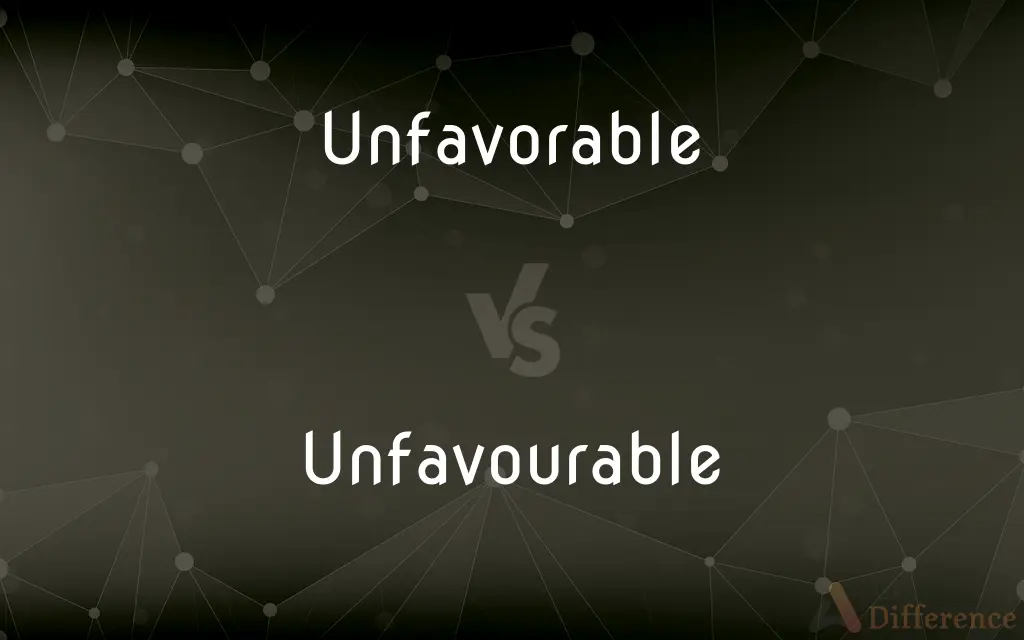Unfavorable vs. Unfavourable — What's the Difference?
Edited by Tayyaba Rehman — By Urooj Arif — Updated on March 27, 2024
"Unfavorable" and "unfavourable" are the same in meaning, indicating disapproval or disadvantage, but differ in spelling based on American ("unfavorable") versus British ("unfavourable") English conventions.

Difference Between Unfavorable and Unfavourable
Table of Contents
ADVERTISEMENT
Key Differences
The distinction between "unfavorable" and "unfavourable" lies solely in their spelling, which reflects the differences between American and British English. Both terms describe something that is not advantageous, not beneficial, or received poorly. For instance, "unfavorable weather conditions" and "unfavourable weather conditions" convey the same meaning: weather that is not conducive to outdoor activities or could potentially cause harm or inconvenience.
In the context of reviews or feedback, "unfavorable" (American English) and "unfavourable" (British English) are used to describe negative assessments or opinions. Whether a product receives unfavorable reviews in the U.S. or unfavourable reviews in the U.K., the implication is that the product did not meet expectations or standards.
The usage of these terms extends to conditions or situations, describing circumstances that are not conducive to success or well-being. An "unfavorable economic climate" in American publications translates to an "unfavourable economic climate" in British sources, both indicating economic conditions that hinder growth or stability.
Despite their spelling differences, the choice between "unfavorable" and "unfavourable" does not impact the terms' meanings or applications. The selection depends on the intended audience or the standard spelling conventions of the text's country of origin. Writers and speakers choose the variant that aligns with their or their audience's dialect of English, maintaining consistency in spelling according to regional norms.
The interchangeability of "unfavorable" and "unfavourable" underscores the broader phenomenon of American and British English variations, where words share meanings but differ in spelling, reflecting the linguistic evolution and cultural distinctions between the two versions of the language.
ADVERTISEMENT
Comparison Chart
Meaning
Not advantageous, beneficial, or well-received.
Not advantageous, beneficial, or well-received.
Spelling Variation
Lacks the "u" before the "r".
Includes the "u" before the "r".
Usage
Used in American publications and communications.
Used in British publications and communications.
Examples
Unfavorable weather, unfavorable reviews.
Unfavourable weather, unfavourable reviews.
Regional Preference
Preferred in the United States.
Preferred in the United Kingdom and other regions using British English.
Compare with Definitions
Unfavorable
Disapproving or critical.
The critic wrote an unfavorable review of the play.
Unfavourable
Detrimental or adverse in nature.
Unfavourable weather conditions delayed the flight.
Unfavorable
Detrimental or adverse in nature.
Unfavorable conditions hampered the expedition.
Unfavourable
Disapproving or critical.
The novel received unfavourable criticism.
Unfavorable
Not positive or encouraging.
The project received unfavorable feedback.
Unfavourable
Not conducive to success.
They faced unfavourable odds in the competition.
Unfavorable
Not conducive to success.
The startup launched in an unfavorable market.
Unfavourable
Exhibiting a lack of support.
Her stance on the issue is unfavourable.
Unfavorable
Exhibiting a lack of support.
He has an unfavorable opinion of the new policy.
Unfavourable
Not positive or encouraging.
The proposal met with unfavourable response.
Unfavorable
Likely to be a hindrance; disadvantageous
Unfavorable winds.
Unfavourable
Serving to hinder or oppose; adverse, disadvantageous, inconducive, unsuitable.
Unfavorable
Having or showing opposition; adverse
An unfavorable reaction to our proposal.
Unfavourable
Not auspicious; ill-boding.
Unfavorable
(American spelling) unfavourable
Unfavourable
Of a belief, state of mind, etc.: not favourable; disapproving.
Unfavorable
Not favorable; not propitious; adverse; contrary; discouraging.
Unfavourable
Of wind or weather: causing delay or obstacles; not conducive to travel or work; inclement.
Unfavorable
Not encouraging or approving or pleasing;
Unfavorable conditions
An unfavorable comparison
Unfavorable comments
Unfavourable
Not encouraging or approving or pleasing;
Unfavorable conditions
An unfavorable comparison
Unfavorable comments
Unfavorable
(of winds or weather) tending to hinder or oppose;
Unfavorable winds
Unfavourable
(of winds or weather) tending to hinder or oppose;
Unfavorable winds
Unfavorable
Not favorable;
Made an unfavorable impression
Unfavorable reviews
Common Curiosities
Can both spellings be used in the same document?
It's best to stick to one spelling variant for consistency, choosing based on the targeted audience or publication standards.
How should non-native English speakers decide which spelling to use?
Non-native speakers should consider the version of English they are learning, the region they are in, or the audience they are addressing.
Are there any rules for when to use American or British spelling?
The main rule is to be consistent within a single piece of writing and to choose the variant that matches the intended audience or publication's standards.
Why do American and British English have spelling differences like this?
Spelling differences arose from historical linguistic developments and standardization processes that diverged between the U.S. and the U.K.
Are "unfavorable" and "unfavourable" interchangeable?
Yes, they are interchangeable in meaning, but the choice of spelling depends on whether American or British English conventions are being followed.
Does the use of one spelling over the other impact understanding?
The understanding is generally not impacted, as the context usually makes the meaning clear, regardless of spelling.
How does the spelling difference affect the pronunciation?
The pronunciation of "unfavorable" and "unfavourable" is virtually identical, despite the spelling difference.
Do these spelling differences extend to other words?
Yes, many words have different spellings in American and British English, such as "color" (American) versus "colour" (British), reflecting the same pattern of variation.
Is one spelling more correct than the other?
Neither spelling is more correct; the preference is purely based on regional language conventions.
How can I remember which spelling to use?
Remembering the intended audience or the origin of the text can help decide whether to use American or British spelling conventions.
Share Your Discovery

Previous Comparison
Bloom vs. Flourish
Next Comparison
Fair vs. PairAuthor Spotlight
Written by
Urooj ArifUrooj is a skilled content writer at Ask Difference, known for her exceptional ability to simplify complex topics into engaging and informative content. With a passion for research and a flair for clear, concise writing, she consistently delivers articles that resonate with our diverse audience.
Edited by
Tayyaba RehmanTayyaba Rehman is a distinguished writer, currently serving as a primary contributor to askdifference.com. As a researcher in semantics and etymology, Tayyaba's passion for the complexity of languages and their distinctions has found a perfect home on the platform. Tayyaba delves into the intricacies of language, distinguishing between commonly confused words and phrases, thereby providing clarity for readers worldwide.















































